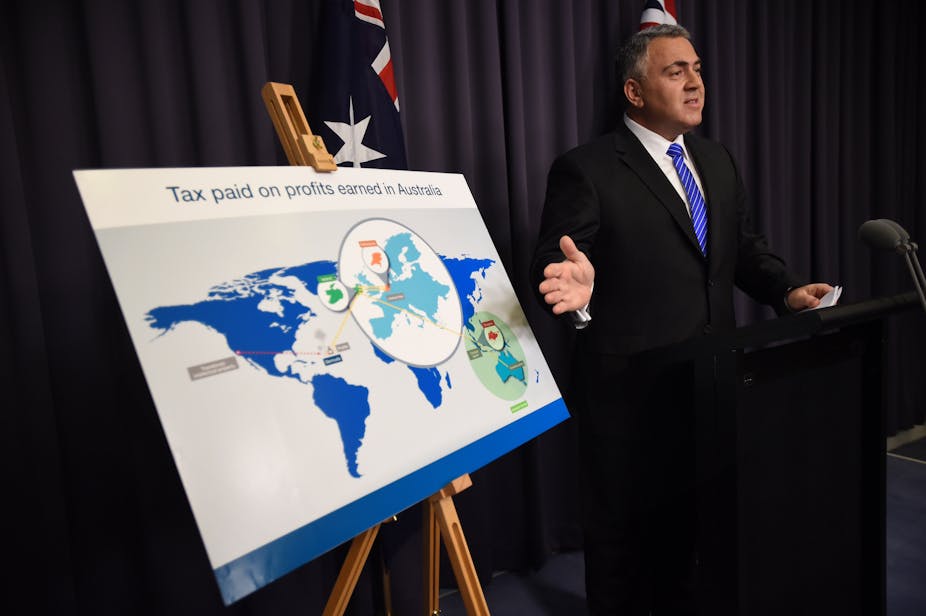The report of the Senate Economics References Committee inquiry into corporate tax avoidance comes with the subtitle – “You cannot tax what you cannot see”, with a strong focus on increased transparency.
The majority of the 17 recommendations in the interim report relate to improved transparency of the tax affairs of corporate taxpayers. This is a significant step in the right direction. Recent experiences in the war on corporate tax avoidance both in Australia and overseas confirm that “information is power”. Most notably, we have seen increased transparency changing the behaviour of multinational enterprises as well as inducing governments to act.
For example, media exposure of Starbucks disproportionate minimal tax payments in the UK forced the company to make “voluntary” tax payments. This was in response to public outcry against its aggressive tax planning strategies. More importantly, the widely reported aggressive tax planning strategies of major multinationals such as Apple, Google and Microsoft has led to ongoing global reform with the G20/OECD project addressing base erosion and profit shifting.
The general public’s awareness of aggressive tax planning by multinationals, and the resulting feeling of unfairness in the tax system, has also led to unilateral actions in the UK. The so called “Google tax” introduced in the UK in April this year appears to have already achieved some early success. Amazon recently announced it has started to pay tax on its sales in the UK rather than in Luxembourg. This is a result of its restructure in response to the Google tax.
Australia is likely to follow the UK’s lead and introduce a new multinational anti-avoidance law. The Bill to implement this law is scheduled for introduction into Parliament in the coming weeks.
Cracking down on marketing hubs
Two recommendations in particular are likely to attract a deal of attention – increased transparency around “marketing hubs” and greater disclosure of information contained in “country-by-country” reports.
The report calls for the Australian Government to work with governments of foreign countries to improve the transparency of information regarding taxation, monetary flows and inter-related party dealings. This recommendation appears to target the use of marketing hubs in Singapore by some of the biggest companies in Australia, including BHP and Rio Tinto, which appeared before the Senate inquiry.
The report also recommends the publication of excerpts from country-by-country reports. An exposure draft of legislation to implement what is known as country-by-country reporting was released by the Federal Government earlier this month. These reports will disclose, on a per country basis, income, taxable profits, tax payments, and other income-generating factors such as employees and assets of a multinational. This information is designed to address information asymmetry and to facilitate tax risk assessments by the ATO. At present, the intention is that only the ATO will be privy to the information contained within those reports.
Commentators argue making this information available to the public will help deter multinationals from engaging in aggressive tax planning. But the business community has pushed back both in Australia and overseas. As such, it is unclear whether the government is willing to adopt this recommendation.
Transparency is stage one
Increased transparency measures and disclosure of relevant information is only the first step in the war on corporate tax avoidance and aggressive tax planning. Ultimately, tax law needs to be effective if the ATO is to prevent profit shifting to low or no tax jurisdictions. The final report, due at the end of November, is likely to focus on more substantive recommendations that address the mechanisms for dealing with base erosion and profit shifting.
A secondary focus will be on, amongst other things, issues such as “excessive debt loading”, where multinationals load debt into high-tax countries and profits to low-tax nations.
Interestingly, reports suggest the Committee removed a recommendation designed to limit the ability of multinationals to use interest deductions to reduce their tax bills in Australia. The removed recommendation reportedly proposed a worldwide group debt-to-equity ratio to limit interest deductions of multinationals.
Targeting interest deductions
Interest deductions are also a significant aggressive tax planning issue. Many multinationals have been successful in shifting substantial profits from Australia by claiming interest expense paid to related parties.
Oil company Chevron is currently locked in a battle with the ATO before the Australian Federal Court on this issue. The ATO is seeking to retrieve A$322 million, including penalties, from Chevron. In that case, Chevron’s Australian subsidiary claimed interest deductions paid to its sister company in the US at an interest rate of 9%. However, the group as a whole borrowed money from third parties at 1.2%. To make matters worse, the interest income received by the sister company from Australia is not subject to tax anywhere in the world.
The Chervon case highlights how current thin capitalisation rules in Australia are not effective in preventing profit shifting. The fundamental problem of the rules is the general failure to take into consideration the financial and tax situations of the corporate group as a whole. Instead, the current rules focus on the Australian subsidiary as a stand-alone company independent from its group members.
The Committee’s original recommendation to apply a worldwide group ratio to limit interest deductions is again a significant step to curbing aggressive tax planning and corporate tax avoidance. The OECD suggested a similar worldwide group ratio in December 2014, but met fierce opposition from business. It has been reported (NEED LINK) that the OECD is likely to drop this suggestion in its final report on interest deductions to be released next month. This suggests a recommendation to apply worldwide gearing ratio to limit interest deductions is likely to face formidable obstacles.

